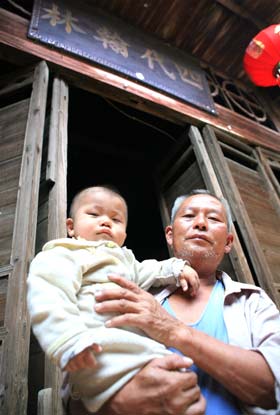
 |
| Zhou Yeji and his grandson pose at the gate of his old house, where four generations of excellent scholars lived in the Qing Dynasty (1644-1911). (China Daily /Huo Yan) |
Around the temple, I find some of the best-preserved ancient buildings I've ever seen.
Zhou Sixiong, a former village head in his 70s, says about 10 old residences were built in the Yuan Dynasty (1271-1368) when the village's forefathers moved from Dao-xian county of Hunan province to the current location.
Twenty residences were built in the Ming Dynasty (1368-1644) and the other 120 in the Qing Dynasty (1644-1911).
Villagers are mostly farmers. Those who have left to work in cities still have a strong sense of the importance of protecting their old houses and spend most of their income on their children's education.
Zhou Chonghui is an 11-year-old primary school student from a family that had four generations of hanlin, equivalent to today's academician, in the Qing Dynasty.
Her parents work in cities, and her grandparents are farmers.
When asked what she would like to do in the future, she says: "I will try my best to study and become a writer in the future."
Her grandfather Zhou Yeji says: "The wars and political movements from the 1910s to the 1970s broke my family's literacy tradition. I hope my granddaughter and grandson can inherit the family's legacy and change their fate through knowledge.
"They represent the future of our village."

















 Man swims in flood to deliver food for pregnant wife
Man swims in flood to deliver food for pregnant wife


![]()
